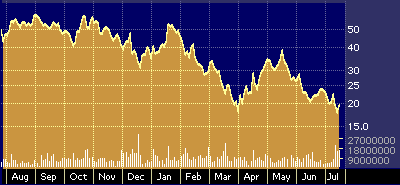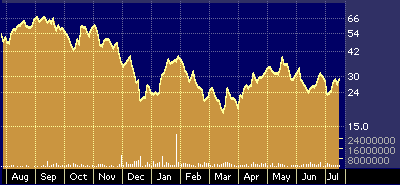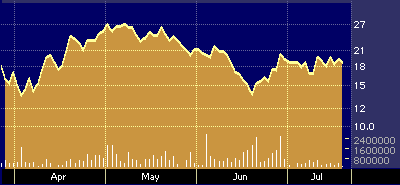
Obscure Tech Sector Poised for Growth
Obscure Tech Sector Poised for Growth
By Hal Plotkin
Silicon Valley Correspondent
Looking for a way to invest in today’s hottest tech sectors without following the herd? You may want to consider companies that tech kingpins will outsource their work to in the future, especially in the wireless infrastructure and optical networking fields.
Lesser-known firms such as Sanmina Corp.{SANM}, Jabil Circuit Inc. {JBL} and DDI Corp.{DDIC} are expected to pick up the slack from bigger firms as large-cap tech companies concentrate more on concepts and services and less on making the products they design.
“In 10 years, outsourced manufacturing won’t just be a trend anymore, it will be how things are done,” says J. Keith Dunne, an analyst at Robertson Stephens, based in San Francisco.
“We believe the fundamental business models within the $155 billion [outsourced products and services] industry are intact,” Dunne says. “Returns on invested capital should remain at healthy levels, particularly for companies targeting the right applications.”
On Monday, Sanmina and Jabil Circuit were reiterated as “strong buys” by Banc of America Securities analyst Paul Fox, who raised his 12-month price target on Sanmina to $170 from $150.
Stocks in the electronics manufacturing products and services sector easily outperformed the market over the past 12 months, rising 170 percent as a group, compared to 61 percent for the NASDAQ.
Analysts say these companies will benefit from a fundamental shift in the economy, as more companies with familiar brand names jettison their own manufacturing facilities and concentrate on conceptualizing new products, marketing, sales and support.
As that happens today, the best contract manufacturers are developing core competencies in design, engineering, and manufacturing that make it harder for single-product line producers to keep up.
Leading contract manufactures can also usually keep their facilities humming all year long, often around the clock, maximizing their efficiency. Product-specific production facilities are often idle due to inventory management issues.
Companies riding the higher-margin end of the outsourced manufacturing trend include Sanmina Corp.{SANM}, Jabil Circuit Inc.{JBL}, and the somewhat lesser known DDI Corp.{DDIC}.
Sanmina {SANM}
San Jose, Calif.-based Sanmina currently generates approximately 70 percent of its revenue from sales of mostly big ticket items to Nortel Networks Corp. {NT}, Alcatel {ALA), Lucent Technologies Inc. {LU}, Motorola Inc. {MOT}, and Solectron Corp. {SLR}.
The average tenure of Sanmina’s customers is 12 years, according to the company.

Sanmina 52-week stock performance chart
“We’ve been able to attract an excellent customer base heavily focused on the communications sector,” says Randy Furr, Sanmina’s president and chief operating officer. “Obviously, we’ve been doing a good job of holding on to our customers.”
Furr delivered a very optimistic assessment of his company’s prospects at a recent investor conference hosted by Robertson Stephens in San Francisco.
“I think we’re really poised to see more profitable growth,” he said.
“Sanmina is a special company,” says Michael Morris, an analyst at Salomon Smith Barney, based in San Francisco. “There’s an almost insatiable demand for the large enterprise-level communications systems and Sanmina essentially has the whole food chain. Sanmina’s stock is a rifle shot on the high end of the communications group.”
Morris currently has a “buy” rating on Sanmina’s stock along with a $122 12-month price target. Sanmina was trading at 106 1/8 on Tuesday.
John McManus, an analyst with Needham & Company, in New York, has a $135 12-month price target on the stock, which he calls a “strong buy.”
“Sanmina is one of the most vertically integrated of all contract manufacturers,” he says. “They have a history of 26 consecutive quarters meeting or beating [earnings] expectations. They have the model many other companies are trying to follow.”
“We like Sanmina’s position on the high-end,” agrees Scott Heritage, an analyst at UBS Warburg, based in New York.
He also has a “strong buy” rating on the stock, along with a $117 12-month price target.
Jabil Circuit {JBL}
Based in St. Petersburg, Jabil Circuit is widely acknowledged to be one of the best-run contract manufacturers. The company, which had a much larger exposure to the low-margin personal computer business a few years back, has been moving successfully into the same higher-margin communications markets target by rival Sanmina Corp.
Over the past three years, Jabil Circuit’s earnings per share have grown an average of 46 percent annually on a 45 percent average annual gain in sales.
The numbers reflect the company’s success in diversifying its customer base, from 20 in 1998 to more than 35 major customers during its most recent quarter. The firm’s top customers, which together account for 75 to 85 percent of sales, include Cisco Systems Inc. {CSCO}, Dell Computer Corp. {DELL}, Hewlett Packard Company {HWP}, Lucent, Nortel, and Gateway Inc. {GTW}. Newer customers include Alcatel, Ericsson {ERICY}, Nokia Corp. {NOK}, and Motorola.
“We’re in the middle of one of the largest growth opportunities in the [contract manufacturing] business today,” says Tim Main, Jabil Circuit’s president.
“A single point of market penetration is worth several billion dollars in growth,” he says. “We’re looking at very substantial, robust growth for the foreseeable future.”
Main says his company is ahead of track this year on his goal to grow operating income by at least 30 percent a year.
“Jabil Circuit may be the best run company in the industry,” says Heritage, of UBS Warburg. “They have a plan and have proven that they can execute on that plan.”
Heritage currently has a “strong buy” rating on the stock along with a 12-month price target of $60. On Friday, Jabil closed at 52 3/16.

Jabil 52-week stock performance chart
Although the company has made some recent acquisitions, one of the keys to Jabil’s success, say the analysts, is related to the company’s strategy of relying on internal growth.
“That helps them maintain the consistency customers are looking for,” says Heritage.
“We call Jabil Circuit the ‘green berets’ of the industry,” says Morris, of Salomon Smith Barney. “They’re focused, disciplined, have implementations second to none, and are known for their high-end systems. They also have a smaller revenue base, so they’re not working against the law of large numbers. They’re in a terrific position from which to grow.”
Morris currently has a “buy” rating on the stock, along with a 12-month price target of $61.
DDI Corp. {DDIC}
Anaheim, Calif.-based DDI Corporation was created through the July, 1998 merger, or roll-up, of two of the leading time-to-market circuit board makers, Dynamic Circuits Inc., and UK-based MCM Electronics, Ltd. The newly combined company went public on April 14, with shares initially priced at $14.

DDI Corp. 52-week stock performance chart
DDI’s recent IPO makes it one of the newer names among publicly traded high-end contract-manufacturing stocks.
Despite a recent drop in the stock’s price, analysts say DDI has one of the best business models in its fast-moving sector. The company focuses almost entirely on providing high margin, quick-turn production of prototype and pre-production circuit boards for the communications, computer, and general electronics markets.
“The culture we’ve set up says it is not okay to be three hours late getting product to a customer,” says Bruce McMaster, DDI Corp.’s president and chief executive officer.
“We have people who think in weeks, not months, days, not weeks, hours, not days,” he says.
More than 50 percent of DDI’s sales are for products delivered within 10 days of when they’re ordered, according to the company.
The speed allows DDI to charge premium prices. The average selling price of circuit board panels produced in the firm’s Anaheim facility, for example, is $1,127. Once they become commodities, similar boards can be produced for as little as a few dollars each.
Analysts say the ever increasing pace of the high-technology sector, which forces companies to bring new products to market faster and faster, puts DDI in a position to prosper.
“They’re getting a huge premium for quick-turning products,” says McManus, of Needham & Company.
Eric Gomberg, an analyst at Thomas Weisel Partners, based in New York, upgraded the stock from a “buy” to a “strong buy” on Friday, after the company announced its pending acquisition of Virginia-based Automata International Inc.
Gomberg, who has a $48 12-month price target on the stock, says the acquisition should boost DDI’s earnings to $1.13 a share in calendar year 2001, up from the $1.06 he had previously projected. DDI is currently trading at $31 3/4.
He says DDI is delivering a critical and increasingly indispensable advantage to its customers. “In this marketplace, time to market is almost everything,” he says. “You can’t win if you don’t have a product out there.”


